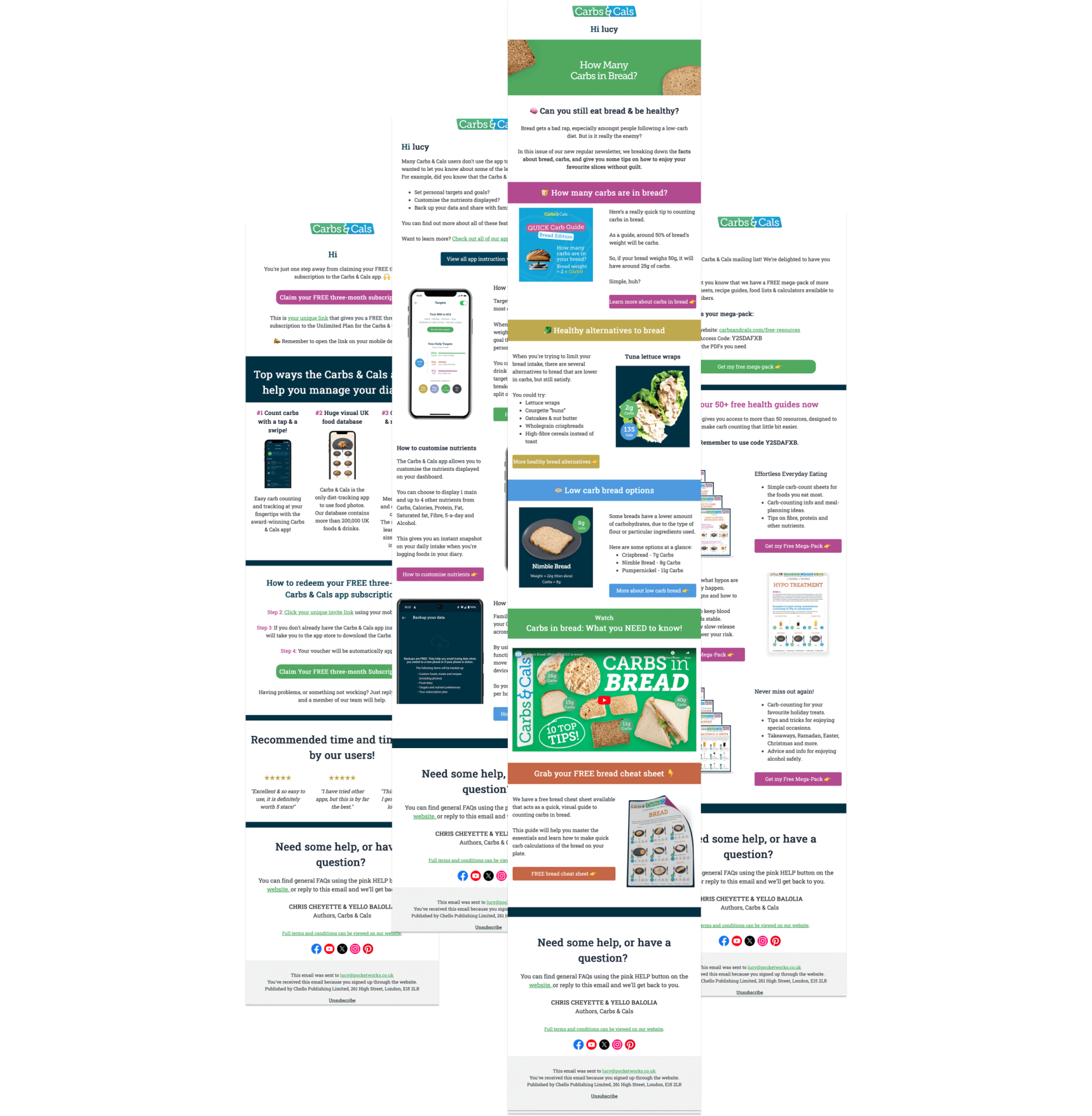Potatoes are one of the world’s most popular and versatile foods, but they’re often misunderstood when it comes to their place in a healthy diet.
While potatoes have gained a reputation for being high in carbs and calories, the reality is more nuanced.
The good news is that potatoes aren’t just empty carbs; they’re packed with important nutrients like vitamin C, potassium, and fibre, making them a valuable part of a balanced diet.
This comprehensive guide will help you navigate the carb content of various potato dishes and discover healthier alternatives.
How many carbs in potatoes?
Potatoes are a great source of carbohydrates, along with vitamins, minerals and fibre. Carbohydrates are the main source of glucose (sugar) in the body. They are an important part of the diet for many people, providing a cheap and versatile source of energy.
Potatoes come in many different varieties and are often labelled ‘bad’ for being high calorie or a cause of weight gain. However, it is often how they are prepared and cooked that causes them to be high in calories or fat.
If you have type 1 or type 2 diabetes or are keeping an eye on your blood sugar levels, it is important to keep track of your carbohydrate intake. Carbs can increase your blood sugar. The level of carbs in potatoes is affected by the portion size, cooking method and the type of potato that you use. For example, the carbs in a jacket potato are higher than in boiled new potatoes.
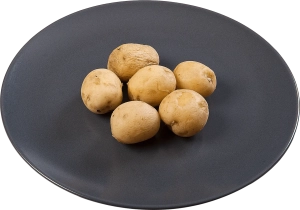
29g
Carbs
New Potatoes (boiled)
Weight = 195g
Carbs = 29g
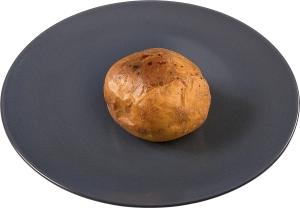
47g
Carbs
Baked Jacket Potato
Weight = 220g
Carbs = 47g
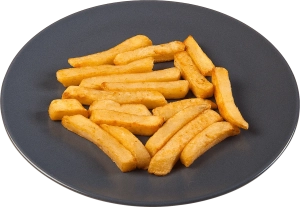
60g
Carbs
Chips (deep fried)
Weight = 168g
Carbs = 60g
Health benefits of potatoes
Potatoes are a starchy food and a healthy carbohydrate that is low in calories and a great source of nutrients, including vitamin C, vitamin B6 and potassium, which can help regulate blood pressure. They are also a great source of fibre, helping you meet the recommended daily value of 30g fibre for adults. In addition, potatoes contain resistant starch, which is linked to having beneficial effects on gut bacteria.
Despite being a complex carbohydrate, most potato varieties have a higher glycemic index (GI). This causes them to increase blood sugar levels faster than other types of complex carbohydrates. Sweet potatoes and new potatoes have a low GI compared to mashed or baked potatoes, meaning they are less likely to cause a spike in blood glucose after eating.
To avoid higher glucose levels, you should consider your serving size. In addition, to keep calories and fat down, think about the cooking method. For example, when roasting potatoes, use less vegetable oil, and for mashed potatoes, use milk rather than butter or oil.
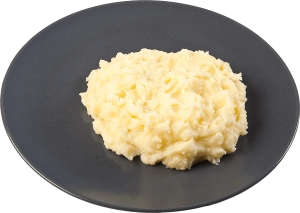
55g
Carbs
Mashed Potato
(with semi-skimmed milk)
Weight = 355g
Carbs = 55g / Cals = 247

56g
Carbs
Mashed Potato
(with butter)
Weight = 355g
Carbs = 56g / Cals = 362
Carbs in French fries & chips
Chips and French fries are one of the high-calorie methods of cooking potatoes. French fries are usually made from russet potatoes and are the thinnest of the deep-fried potatoes. A favourite of fast food chains, French fries contain more fat and calories because their smaller surface area allows the oil they are fried in to easily penetrate all the way through the chip, which also removes some of the potato’s nutritional value.
Takeaway chips from a fish & chip shop often come in larger portions than you may be used to eating at home. The small portion shown below contains 43g carbohydrates, but many chip shops would have a portion of between 50g to 80g carbs as a small or medium.
Oven chips contain fewer calories and fat compared to French fries, and are a good alternative if you are aiming to lose weight.
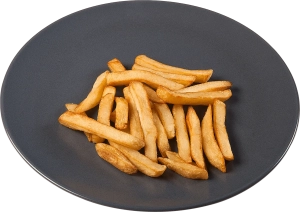
30g
Carbs
Chips (oven)
Weight = 100g
Carbs = 30g / Cals = 162
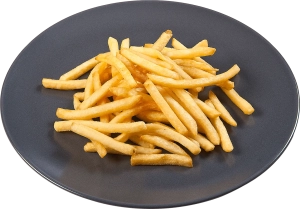
38g
Carbs
French Fries
Weight = 96g
Carbs = 38g / Cals = 278

60g
Carbs
Chips (deep fried)
Weight = 168g
Carbs = 60g / Cals 459
Low carb alternative to potatoes
Potatoes can contribute significantly to your total carb intake. Substituting regular potatoes for other veggies can help to maintain a low carb diet. Baked butternut squash makes a great alternative to potatoes. Cut them into small wedges with a splash of olive oil and a sprinkle of your favourite herbs.
Sweet potatoes have a lower glycemic index compared to potatoes. In addition, keeping the skin on sweet potatoes increases the fibre content. Replace mashed potatoes with mashed sweet potatoes or mashed cauliflower. Boil the cauliflower until it is soft, and then mash with oil or butter. Even mixing half mashed cauliflower and half mashed potatoes helps to reduce the post-meal blood sugar spike.
Other veggies that make good potato alternatives include roasted or mashed swede. Adding carrots also incorporates a second vegetable. Celeriac cut into wedges and roasted in oil is a great alternative to chips and has the added benefit of being a probiotic.
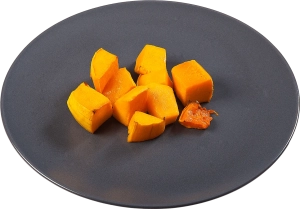
10g
Carbs
Butternut squash (baked)
Weight = 130g
Carbs = 10g / Cals = 42
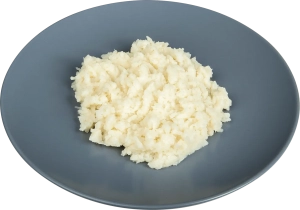
8g
Carbs
Mashed Cauliflower
Weight = 225g
Carbs = 8g / Cals = 65
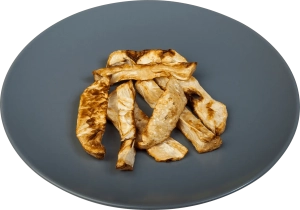
2g
Carbs
Celeriac Wedges
Weight = 80g
Carbs = 2g / Cals = 19
How many carbs in sweet potatoes?
Sweet potatoes have similar carbs, fat and protein levels to white potatoes. However, due to their lower GI, sweet potatoes are a good alternative if you are aiming to manage your weight and have a slower increase in blood glucose.
Sweet potatoes are also very versatile and can be baked like a jacket potato, roasted in pieces or wedges, or mashed. The examples below show a medium portion of sweet potato that has been baked, mashed and cooked whole.
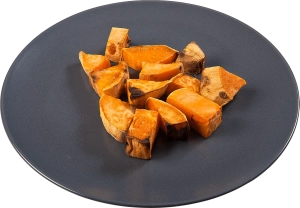
45g
Carbs
Sweet Potato (baked)
Weight = 160g
Carbs = 45g
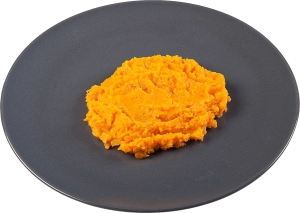
33g
Carbs
Mashed Sweet Potato
Weight = 160g
Carbs = 33g
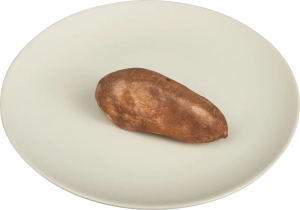
35g
Carbs
Whole Sweet Potato (baked)
Weight = 125g
Carbs = 35g
How does portion size affect carbs in potatoes?
As with all food that contains carbs, the serving size will determine the carb content. So the larger the portion of potato, the more carbs it will contain. Counting carbs is a great way to help with weight loss and blood sugar levels. When eaten in moderation, potatoes can be a healthy food and part of a low carb diet.
When counting carbs in potatoes, you can either use the raw weight (weighing the potato before it is cooked) or the cooked weight. To help with carb counting, use the Carb & Calorie Counter book or Carbs & Cals app to easily see the carbs in your portion, as well as all the other nutrition facts like calories, protein, fat and fibre.
In the example below, you can see how the portion size of boiled potatoes affects the carb content, with the small portion having 26g of carbs and the large portion having 79g.
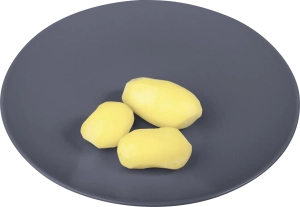
26g
Carbs
Potato (peeled & boiled)
Weight = 150g
Carbs = 26g
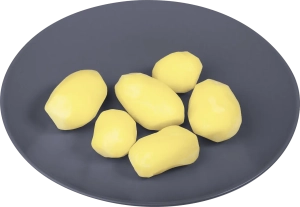
53g
Carbs
Potato (peeled & boiled)
Weight = 300g
Carbs = 53g
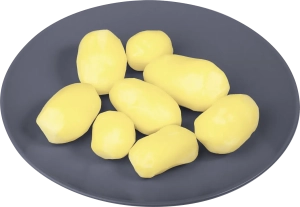
79g
Carbs
Potato (peeled & boiled)
Weight = 450g
Carbs = 79g
How many carbs in potatoes served with a cooked breakfast?
There is a range of potato options that come with a cooked breakfast. These are often pre-cooked and frozen to be reheated. Popular options include hash browns, potato slices and potato waffles.
The amount of carbs in potatoes will depend on the serving size. For example, the individual carb content for hash browns will depend on the brand, but the carb content would be around 12g of carbs for one hash brown, 24g for two, or 36g for three.
In the examples below, you can see the carb values vary between 12g for a hash brown or potato waffle, to 23g for a medium portion of potato slices.
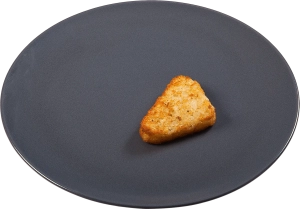
12g
Carbs
Hash Brown (baked)
Weight = 44g
Carbs = 12g
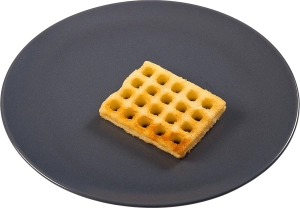
12g
Carbs
Potato Waffle (baked)
Weight = 49g
Carbs = 12g
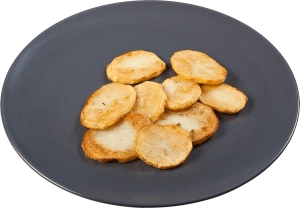
23g
Carbs
Potato Slices (baked)
Weight = 80g
Carbs = 23g
Want to Learn More?
Grab a Copy of Carb & Calorie Counter
The multi-award-winning Carb & Calorie Counter book is your definitive, expert-approved guide to carb and calorie counting.
- Over 1700+ high-quality food photos
- Up to six portion sizes per food
- At-a-glance carbs and key nutrients
- The Original #1 Bestseller
With the “Carb-Counting Bible”, a single flick of the page is all you need to plan nutritious, carb-counted meals.
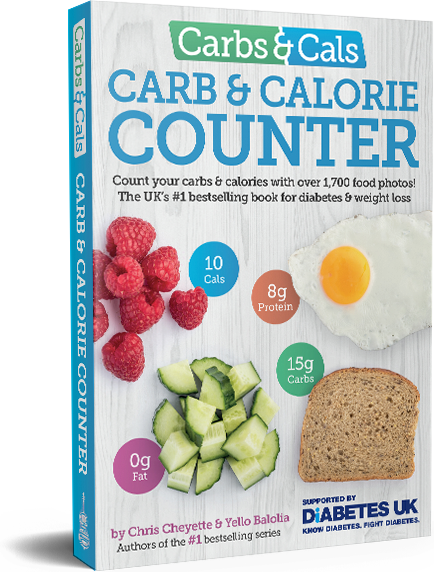
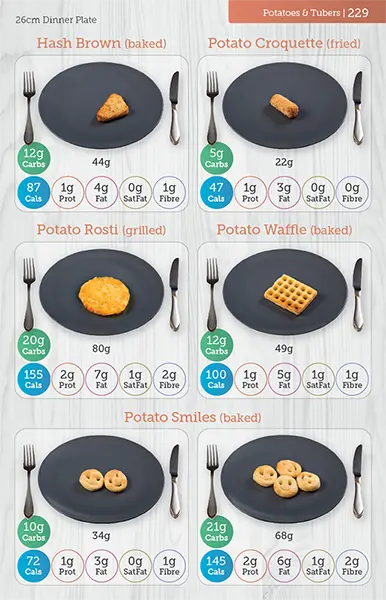
Contains a whole chapter with 54 photos of different types of potatoes!
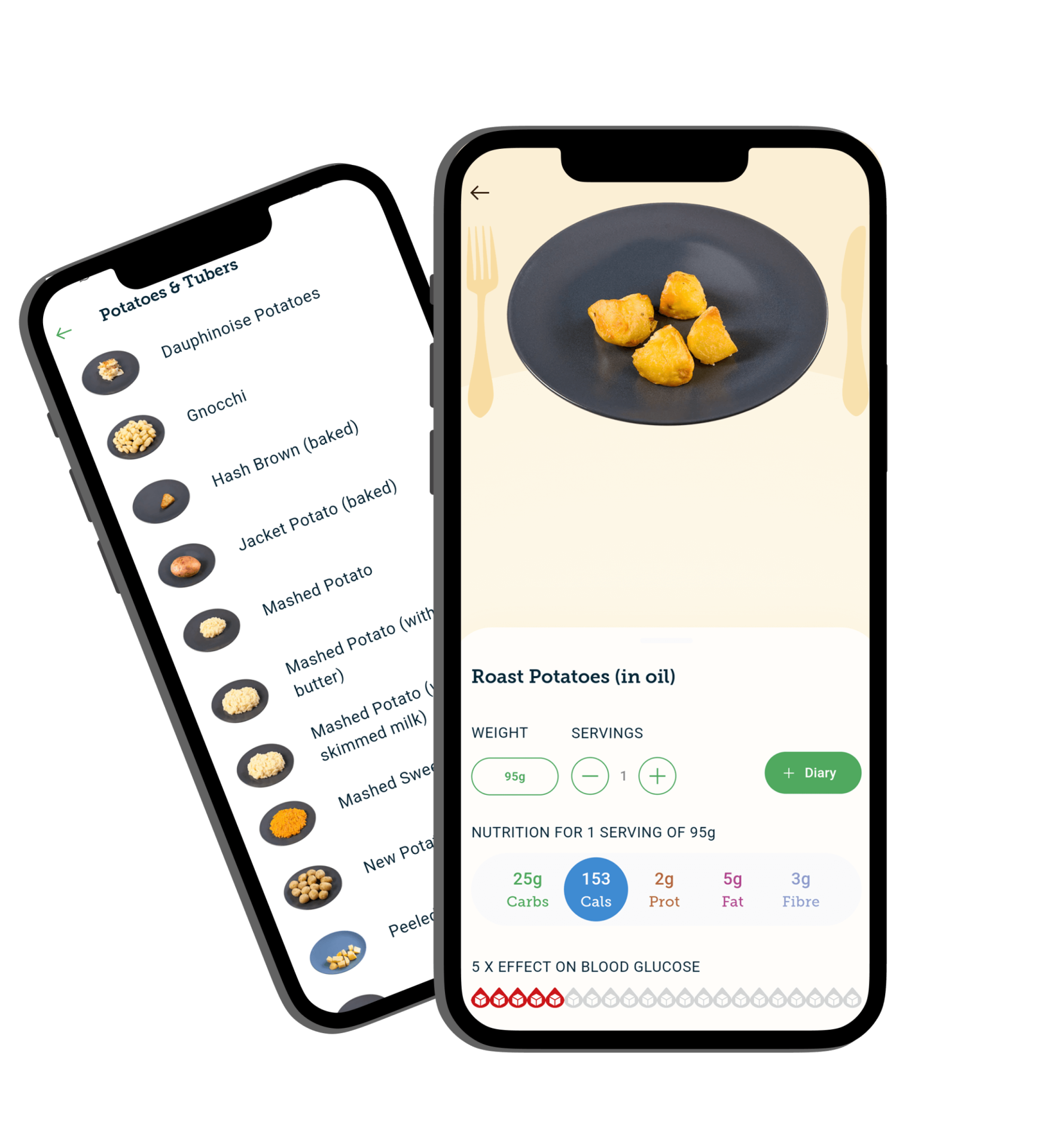
Sign up to the Carbs & Cals mailing list
Want to learn more about carb counting and the role of food in managing your health? Sign up to our mailing list!
